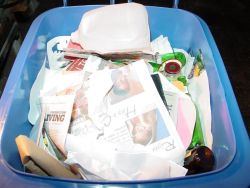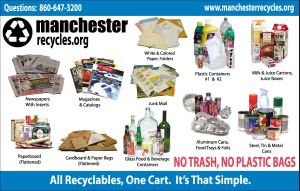Educating Residents About Single Stream Recycling
 Implementing any new changes in a recycling program or system, requires strong public education with consistent messaging to ensure residents understand the proposed changes in the recycling program. Single Stream education is no exception.
Implementing any new changes in a recycling program or system, requires strong public education with consistent messaging to ensure residents understand the proposed changes in the recycling program. Single Stream education is no exception.
Plan Early
Develop a plan early in the process and implement a program kick-off to generate interest in and enthusiasm for the program. Make sure all educational materials address the why, what, how, where and when of the program – creating guides, brochures, websites, FAQs, Do’s and Don’ts or other venue to best reach the residents of your community. Tailoring the materials to meet the needs of your community are important – including translating materials for those who do not speak English or addressing concerns of specific populations, including the elderly or those with physical challenges.
Don't Stop Educating

On-going communication is important. Don’t stop at creating a new brochure or web-page, and don't assume that once you've introduced the program to residents that it will run on automatic pilot. Create opportunities for residents to ask questions or learn more about the changes in your program. Remember that not everyone is computer savvy and offer a phone number on all education materials where people can speak to someone for more information. Be sure to change your phone greeting message to include an option for information on your new collection system.
When you change to a single stream collection method, most likely your community is also changing other parts of your program including the type and size of the recycling container, types of acceptable material or how materials are picked up (perhaps every other week or a different day than trash for curbside). It will take your residents time to adjust to all the changes. It is important that residents understand that recyclables still need to be separated from the trash.
Publicity Tools
A variety of publicity tools can be employed to convey your message, such as:
- A letter from the mayor or county commissioner to residents and businesses
- Special events such as games and contests
- Printed materials
- Mass media announcements
- Personal outreach at public events
- Block leaders
- Direct communication with individual residents
- Presentations or displays at schools, fairs, and community events
- Messages mailed with utility bills
Borrowing ideas from others who have successful public education can be a great way to create effective materials. If you are copying someone else’s materials, be courteous and seek permission from the author first. Here is a sampling of publicity on single stream recycling from Connecticut and beyond:
Flyers, Brochures and Guides

Granby, CT (letter informing residents of program)
Take it to the Curb, Recycling and Trash Collection Guide (28 pages), Arlington VA
Philadelphia, PA (flyer)
Baton Rouge, LA (8-page guide)
Digital/Web-Based Media
Springfield, MA (web page with info how they phased in single stream city-wide; plus Do’s and Don’ts and FAQs)
Baltimore County, MD (web page)
What is Single Stream? (RecycleBank video, 7 1/2 minutes)
Single Stream Recycling - How It Works (video by FCR Recycling/Casella, the contracted operator of the CT Resources Recovery Authority's recycling facility, 5 1/2 minutes)
Disclaimer: The Connecticut Department of Energy and Environmental Protection (DEEP) maintains the content on this web site to enhance public access to information and facilitate understanding of waste reduction, reuse and recycling. The DEEP is not recommending these resources over any others and recognizes these represent only a partial listing of resources on this subject.
Content Last Updated February 2020

